LIMITS OF TRADITIONAL KEY SYSTEM
Nearly every company would consider a safe and secure workplace to be a top priority. This is especially the case when you are responsible for protecting and distributing the water supply for millions of people. The fear of terrorist attacks, coupled with strict Homeland Security regulations, have forced many water facilities to look for a cost-effective and versatile system to control access and eliminate key control problems.
After 9/11, the Atlanta-Fulton County Water Treatment Facility became more concerned with knowing who has access to vital parts of their infrastructure. With any mechanical key system, it is difficult to know who has keys to which locks. A traditional key system also means that those individuals who are authorized to have keys have unlimited access throughout the day, with no evidence to show who opened which locks.
Located in Alpharetta, Georgia, the United States, the Atlanta-Fulton County facility is one of the largest in the state. The facility is operated by a joint venture of USFilter & Khafra Engineering Consultants, Inc. USFilter manages more than 550 water and wastewater treatment facilities throughout the United States. They needed a system that could control access to a variety of openings, such as main entrances and office doors, as well as storage areas, padlocks, gates, computer cabinets that house the control systems for the plant, and chemical feed areas.
FROM MECHANICAL TO ELECTRONIC
USFilter selected CyberLock for its versatility, security features, and ease of installation. CyberLock cylinders are designed to replace traditional mechanical lock cylinders, and install easily without the need for expensive hardwiring. All they had to do was remove the cylinders in their existing mechanical locks and replace them with CyberLock electronic cylinders. With the large selection of electronic cylinders available, USFilter was able to replace the mechanical cylinders in all of these locations with electronic cylinders. They have also replaced standard mechanical padlocks in many critical areas with CyberLock electronic padlocks.
Terry Jones, assistant project manager for USFilter, says, “CyberLock has done everything that I was told it could do, and more.” Each person’s electronic key is programmed with their access privileges to open selected locks and padlocks on specific days and only during certain times on those days. A record of each opening and attempted access is stored in both the lock and the key. Keys can be set with an expiration date, which minimizes the security risk when distributing keys to temporary contractors.
With the addition of CyberLock, security at the Atlanta-Fulton County Water Treatment Facility has vastly improved. “The tasks of maintaining a mechanical key system, including re-keying and re-coring, are relegated to the past. When a key is misplaced, or falls into the wrong hands, the key can be blocked from the system, making it inactive. With CyberLock, we have been able to implement and maintain an increased security plan when alert levels issued by the government change rapidly,” says Jones.
|
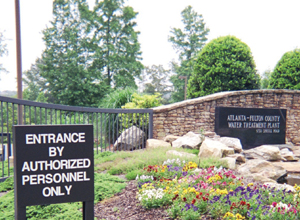
|
|
Atlanta-Fulton County Water Treatment Facility (Photo by VIDEX, Inc.)
|
|
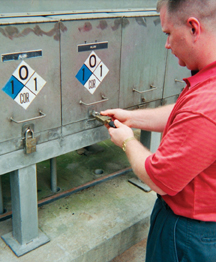
|
|
Assistant Project Manager for USFilter, opening a CyberLock electronic padlock in the chemical feed area (Photo by VIDEX, Inc.)
|
|
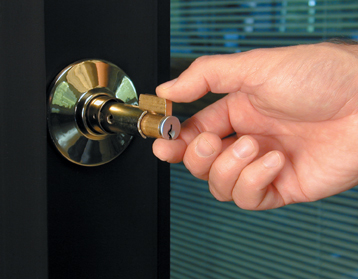
|
|
Removing the mechanical cylinder from a knob set on a door (Photo by VIDEX, Inc.)
|
|
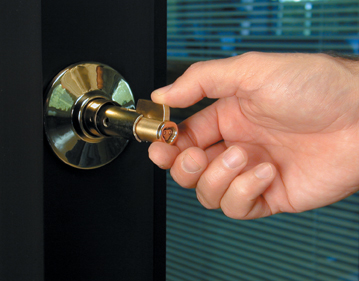
|
|
Installing an electronic cylinder in the doors knob set (Photo by VIDEX, Inc.)
|
|
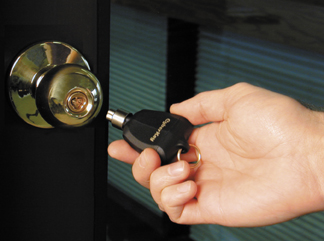
|
|
The doors knob set hardware with a CyberLock cylinder (Photo by VIDEX, Inc.)
|
|
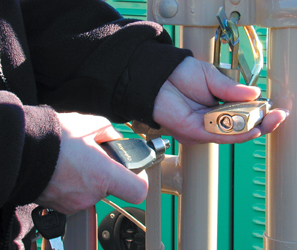
|
|
CyberLock electronic padlock in a gated area (Photo by VIDEX, Inc.)
|
|
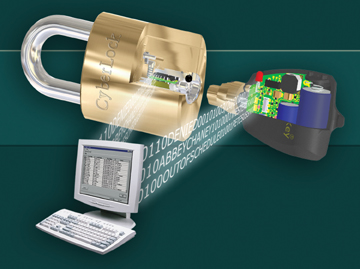
|
|
Image displaying how CyberLock functions (Photo by VIDEX, Inc.)
|
For more information, please send your e-mails to swm@infothe.com.
ⓒ2007 www.SecurityWorldMag.com. All rights reserved.
|



